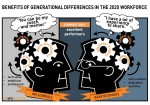 As we move towards the 2020 workforce, companies face an interesting demographic dynamic in terms of talent acquisition — a workforce comprised of Millennials, Gen Xers, Baby Boomers and traditionalists.
As we move towards the 2020 workforce, companies face an interesting demographic dynamic in terms of talent acquisition — a workforce comprised of Millennials, Gen Xers, Baby Boomers and traditionalists.
While each of these groups has their own generational differences, the most notable are the expectations and approaches to work between Millennials, who will make up the majority of the workforce, and Baby Boomers. With the latest Bureau of Labor Statistics Occupational Outlook Handbook projecting total employment to increase by 15.6 million jobs by 2020, generational differences will become an additional component of diversity relations at the workplace.
Recruiters and hiring staff must learn to recognize the combined value, perspectives and impact of successfully integrating these distinctly different generations into an organization’s teams, ultimately improving the company’s ability to develop solutions, products and services for the future.
Millennials
Millennials entering the workforce have frequently been characterized as individuals born between 1980 and 2000, who are entitled, lazy, job-hoppers, overly ambitious and unaware of business etiquette. Regardless of how accurate these descriptions are, this generation has demonstrated that it is in search of meaning and purpose.
Millennials want more than just a job; they seek careers that hold their attention and fulfill their ambition, all while providing competitive pay and work-life balance. They want to work for companies that have a reputable brand, as well as products and services of which they can be proud. Unlike older generations, that didn’t have the same access to technology, Millennials are driven by out-of-the-box thinking, collaborative approaches to solutions and the ability to leverage the fastest, most efficient means of accomplishing goals.
Baby Boomers
A growing number of workers age 55 to 64 are continuing to work longer, yet in 2020 this generation of workers will only make up about 20% of the workforce. They have an entirely different approach to work than Millennials, and are often characterized as conscientious, dedicated, independent-minded workers who enjoy working alone on projects and then rejoining the team to reveal results.
Baby Boomers can find it difficult to work with Millennials, because they don’t understand the younger generation’s need for coaching, mentorship and collaborative work. They grew up in a time of stability, economic prosperity and opportunity when higher education and wider career options were becoming more accessible. Parents were away from the home more and children became latch-key kids. As a result, this generation tends to have a work ethic that is focused on self-reliance, paying your dues, putting in overtime and doing everything needed to accomplish tasks.
Common Ground
Despite the generational differences, Millennials and Boomers do have things in common. Both groups are focused on excellent job performance, and that can work to an organization’s advantage. Millennials bring technology savvy and work efficiencies that can benefit companies. Boomers have the ability to provide Millennials with insight on work etiquette, the company’s culture and career tracking by demonstrating clear paths for advancement in the company.
This type of relationship satisfies Millennials’ need for ongoing training, mentorship, and collaboration, while providing Baby Boomers with job stability and value as experienced employees. Companies end up with improved work synergies and succession planning for the organization’s future leaders.
Recruiters and hiring managers will have to become knowledgeable about the different expectations of Millennials and Baby Boomers, providing them with the growth opportunities they seek, while also leveraging their generational differences to create effective teams that can lead companies forward.”